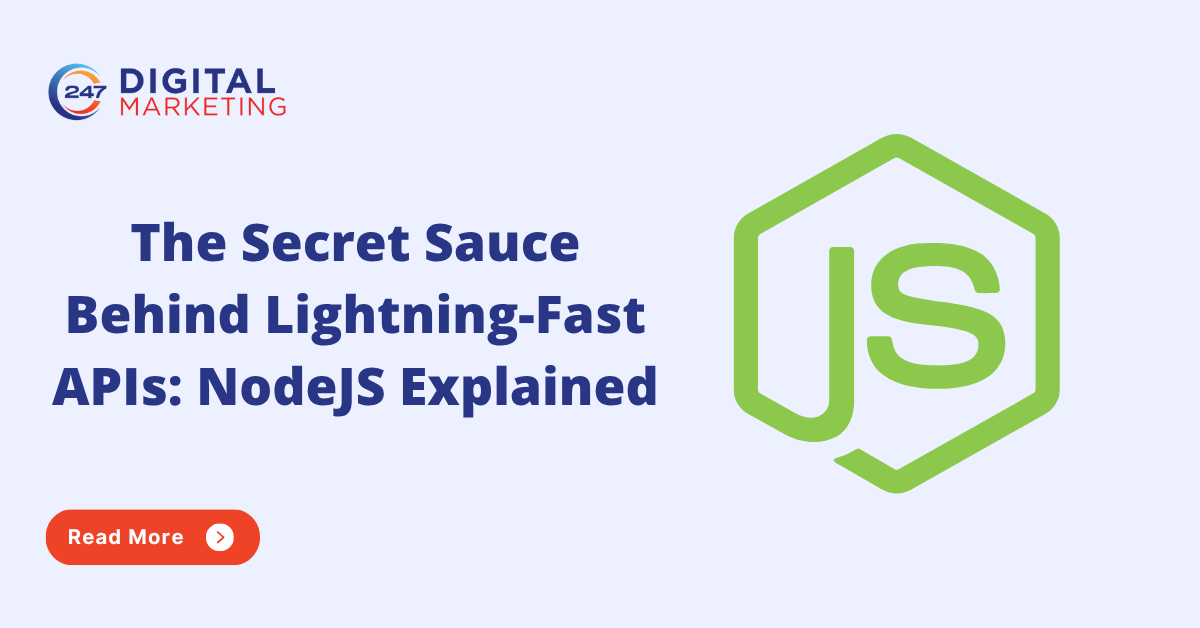The Secret Sauce Behind Lightning-Fast APIs: NodeJS Explained

Introduction
Ever wondered why some APIs feel instant while others lag like an old dial-up connection? The secret often lies in the technology powering them, and that’s where NodeJS comes in. From powering real-time apps to handling millions of requests per second, NodeJS has redefined how developers build scalable, high-performance systems.
In this article, we’ll uncover the secret sauce behind lightning-fast APIs and explain why NodeJS Development Company are leading the charge.
What is NodeJS?
NodeJS isn’t a framework or a language; it’s a runtime environment that allows developers to run JavaScript on the server side. Built on Google’s V8 JavaScript engine, NodeJS enables lightning-fast execution of code, making it ideal for APIs that demand speed and scalability.
It first appeared in 2009, introduced by Ryan Dahl, and since then, NodeJS has transformed how modern web applications are built.
The Core of NodeJS: The Event-Driven Architecture
Unlike traditional servers that use multiple threads to handle each request, NodeJS uses a single-threaded, event-driven architecture. This design allows it to handle thousands of concurrent connections without breaking a sweat.
It’s like having one waiter serving an entire restaurant, but this waiter moves so fast that no one feels the delay.
How NodeJS Handles API Requests
When a request hits a NodeJS API, the server doesn’t stop and wait for one operation to finish before moving to the next. Instead, it places the request in an event queue and continues to the next task. When the operation (like a database query) completes, NodeJS calls back the appropriate function to handle the result.
This is what makes NodeJS APIs non-blocking and super responsive.
The Secret Sauce: Asynchronous Programming
At the heart of NodeJS’s power is asynchronous programming. Using callbacks, promises, and async/await, developers can perform multiple operations simultaneously.
Think of it like cooking multiple dishes at once. While one simmers, you start chopping veggies for the next.
This ability to multitask efficiently makes NodeJS the go-to choice for API-intensive applications.
Real-World Performance Examples
When benchmarked, NodeJS APIs often outperform those built with PHP or Python. For example, streaming platforms, chat apps, and e-commerce sites all rely on NodeJS to serve thousands of concurrent users without downtime.
Speed, scalability, and reliability, that’s the NodeJS trifecta.
Why Businesses Choose NodeJS Web Application Development Services
From startups to tech giants, businesses prefer NodeJS Web Application Development Services because they get:
- Faster development cycles
- Cost-effective scalability
- Cross-platform compatibility
- Seamless integration with front-end frameworks
When it comes to enterprise-grade apps, NodeJS delivers both performance and flexibility.
NodeJS and Front-End Frameworks: A Perfect Match
Front-end frameworks like AngularJS, ReactJS, and VueJS pair beautifully with NodeJS, creating a full-stack ecosystem.
NodeJS + AngularJS Web Development Company
An AngularJS Development Company can leverage NodeJS to manage dynamic data and create fast, responsive user experiences.
NodeJS + ReactJS Development Company
A ReactJS Development Company often uses NodeJS for backend services, creating robust, real-time apps like chat systems and dashboards.
NodeJS + VueJS Web App Development
With VueJS Development Company, NodeJS handles API requests seamlessly, ensuring instant front-end updates and smooth interactions.
Together, they form the backbone of today’s high-performing web ecosystems.
Microservices and NodeJS
NodeJS is tailor-made for microservice architecture, allowing developers to build modular APIs that scale effortlessly. Each service runs independently, reducing downtime and improving performance.
Security in NodeJS APIs
Security is paramount. Developers can safeguard their NodeJS APIs using:
- Helmet.js for setting secure headers.
- JWT (JSON Web Tokens) for authentication.
- Rate limiting to prevent DDoS attacks.
A secure API is a fast API because breaches slow everything down.
Optimizing API Performance
Performance optimization in NodeJS involves:
- Caching frequently used data
- Clustering to utilize multi-core CPUs
- Load balancing with NGINX
- Monitoring using tools like PM2 and New Relic
These tweaks turn an already fast system into a lightning-speed engine.
Real-World Applications Using NodeJS
Brands like Netflix, PayPal, Uber, and LinkedIn use NodeJS to handle millions of requests per second. Netflix, for instance, reduced startup time by 70% after migrating to NodeJS.
That’s not just speed, that’s evolution.
Challenges of NodeJS and How to Overcome Them
While NodeJS is fast, it’s not flawless. CPU-heavy tasks can block the event loop, slowing performance. The solution? Offload those tasks to worker threads or microservices.
Smart architecture equals sustained performance.
Future of NodeJS in API Development
With competitors like Deno and Bun emerging, NodeJS continues to evolve. But its massive ecosystem, active community, and enterprise adoption ensure it remains a core player in API development for years to come.
Conclusion
NodeJS isn’t just another backend tool; it’s the secret sauce behind some of the fastest APIs on the web. Its event-driven, asynchronous nature, combined with easy scalability and vast community support, makes it an unmatched choice for modern development.
Mitesh Patel is the co-founder of 247 Digital Marketing, LawFirm Marketing and a columnist. He helps companies like Emerson and other top Fortune 500 compnies to grow their revenue.



